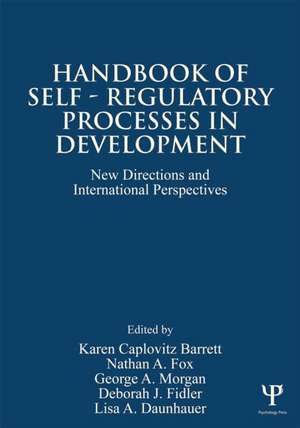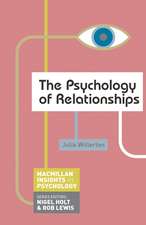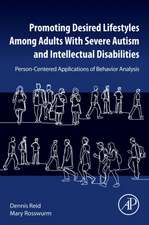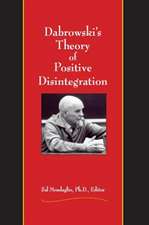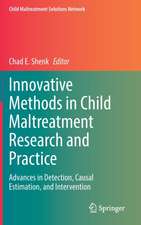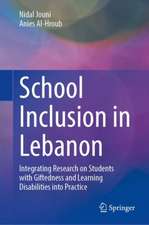Handbook of Self-Regulatory Processes in Development: New Directions and International Perspectives
Editat de Karen Caplovitz Barrett, Nathan A. Fox, George A. Morgan, Deborah J. Fidler, Lisa A. Daunhaueren Limba Engleză Paperback – 18 dec 2012
Outstanding features include:
- Reviews the development of self and emotional regulation from infancy through adolescence.
- Contributors from various countries and backgrounds provide an integrative review of the literature to guide the direction of future research.
- Features contributions from those who have had a strong impact on self-regulation research.
- Reviews research on developmental disorders that have implications for self-regulation.
This book is intended for researchers, graduate students, and practitioners in psychology, neuroscience, human development, and education interested in the development of self and emotional regulatory processes.
| Toate formatele și edițiile | Preț | Express |
|---|---|---|
| Paperback (1) | 907.91 lei 6-8 săpt. | |
| Taylor & Francis – 18 dec 2012 | 907.91 lei 6-8 săpt. | |
| Hardback (1) | 1582.86 lei 6-8 săpt. | |
| Taylor & Francis – 17 dec 2012 | 1582.86 lei 6-8 săpt. |
Preț: 907.91 lei
Preț vechi: 1107.21 lei
-18% Nou
Puncte Express: 1362
Preț estimativ în valută:
173.75€ • 188.67$ • 145.95£
173.75€ • 188.67$ • 145.95£
Carte tipărită la comandă
Livrare economică 22 aprilie-06 mai
Preluare comenzi: 021 569.72.76
Specificații
ISBN-13: 9781848726246
ISBN-10: 1848726244
Pagini: 520
Ilustrații: 30 black & white illustrations, 33 black & white tables, 12 black & white halftones, 18 black & white line drawings
Dimensiuni: 178 x 254 x 27 mm
Greutate: 0.93 kg
Ediția:New.
Editura: Taylor & Francis
Colecția Psychology Press
Locul publicării:Oxford, United Kingdom
ISBN-10: 1848726244
Pagini: 520
Ilustrații: 30 black & white illustrations, 33 black & white tables, 12 black & white halftones, 18 black & white line drawings
Dimensiuni: 178 x 254 x 27 mm
Greutate: 0.93 kg
Ediția:New.
Editura: Taylor & Francis
Colecția Psychology Press
Locul publicării:Oxford, United Kingdom
Cuprins
Section One: Development of Emotion Regulation & Self-Regulation. K. C. Barret, Introduction to Section I. Overview and Analysis. R.A. Thompson, E. A. Virmani, S. F. Waters, H. A. Raikes, S. Meyer, The Development of Emotion Self-Regulation: The Whole and the Sum of the Parts. M. Holodynski, D. Seeger, P. Kortas-Hartmann, V. Wörmann, Placing Emotion Regulation in a Developmental Framework of Self-Regulation. K. C. Barrett, Adaptive and Maladaptive Regulation of and by Emotion: Process, Context, and Relation to Self-regulation. J. Zeman, M. Cassano, M. Adrian, Socialization Influences on Children’s and Adolescents’ Emotional Self-Regulation Processes: A Developmental Psychopathology Perspective. Section Two: Development of Self Regulation: Physiological and Brain Processes. N. A. Fox, Introduction to Section II. Overview and Analysis. H. A. Henderson, P. C. Mundy, The Integration of Self and Other in the Development of Self-regulation: Typical and Atypical Processes. T. A. Dennis, L. J. O’Toole, J. M. DeCicco, Emotion Regulation from the Perspective of Developmental Neuroscience: What, Where, When, and Why. K. Hum, M. D. Lewis, Neural Mechanisms of Emotion Regulation in Children: Implications for Normative Development and Emotion-related Disorders. P. Cédric, M. P. Koolschijn, E. A. Crone, The Neurocognitive Development of Performance Monitoring. A. MacNamara, E. S. Kappenman, S. R. Black, J. N. Bress, G. Hajcak, Integrating Behavioral and Electrocortical Measures of Attentional Bias Toward Threat. Section Three: Development of Self Regulation and Mastery Motivation. N. A. Busch-Rossnagel, G. A. Morgan, Introduction to Section III: Mastery Motivation and Self-Regulation. K. Józsa, D. E. Molnár, The Relationship between Mastery Motivation, Self-Regulated Learning and School Success: a Hungarian and European Perspective. G. A. Morgan, J. Wang, H. F. Liao, Q. Xu, Using the Dimensions of Mastery Questionnaire (DMQ) to Assess Mastery Motivation of English- and Chinese- Speaking Children: Psychometrics and Implications for Self-Regulation. J. Wang, K. C. Barrett, Mastery Motivation and Self-regulation during Early Childhood. M. Cuskelly, L. Gilmore, A. Carroll, Self-regulation and Mastery Motivation in Individuals with Developmental Disabilities: Barriers, Supports and Strategies. Section Four: Self Regulation In A Typical Development. L. A. Daunhauer, D. J. Fidler, Self-Regulation in Atypical Development: An Overview of the Section. C. M. Walcott, Current Perspectives on Preschool Attention-Deficit/Hyperactivity Disorder. S. L. Hepburn, B. C. Wolff, Self-Regulation in Persons with Autism Spectrum Disorders. L. A. Daunhauer, D. J. Fidler, Executive Functioning in Individuals with Down syndrome.
Notă biografică
Karen Caplovitz Barrett, Ph.D., is Professor and Assistant Department Head of Human Development and Family Studies at Colorado State University. Her research takes a functionalist approach to studying emotion processes and their development, with a particular focus on emotion regulation and "social emotions" (such as guilt and shame) during early development, and on cultural and other socialization influences on these processes. Current research projects are in three major areas: (1) the effect of early intervention on early socioemotional competence and school readiness, and on prevention of emotion regulation difficulties; (2) how emotion regulatory and self-regulatory processes develop during early childhood, in typical, atypical, and at-risk populations; and (3) how social emotions develop during early childhood, and how socialization and cultural beliefs impact this development.
Nathan A. Fox, Ph.D., is Distinguished University Professor in the Department of Human Development at the University of Maryland College Park. Professor Fox has completed research on the biological bases of social and emotional behavior developing methods for assessing brain activity in infants and young children during tasks designed to elicit a range of emotions. His work is funded by the National Institutes of Health where he was awarded a MERIT award for excellence of his research program examining social and emotional development of young children. Dr. Fox was awarded the Distinguished Scientific Investigator Award from the National Association for Research in Schizophrenia and Depression (NARSAD) and was appointed a Fellow of the American Association for the Advancement of Science in 2008.
George A. Morgan, Ph.D., is Emeritus Professor of Education and Human Development at Colorado State University. He received his Ph.D. in child development and psychology from Cornell University in 1965. Over the past 35 years, he has conducted a program of research on children's motivation to master challenging tasks. He has advised many Ph.D. students in education and related fields and also has written text books on SPSS and research methods.
Deborah J. Fidler, Ph.D., is Professor of Human Development and Family Studies at Colorado State University. Her research expertise is in the area of early atypical development, with a particular focus on the emerging behavioral phenotype in Down syndrome. She has published over 30 articles on cognition and behavioral development in children with various neurogenetic disorders, with the goal of identifying potential targets for early intervention and improving educational practice in these populations.
Lisa A. Daunhauer, Sc.D., is Associate Professor in the Department of Human Development and Family Studies at Colorado State University. Her research has focused on bridging the divide between research in behavioral phenotypes and cutting-edge practice in intervention science, particularly occupational therapy. Her current projects are designed to examine executive functioning and its relationship to participation in everyday life and academic achievement in children with Down syndrome and other developmental disabilities.
Nathan A. Fox, Ph.D., is Distinguished University Professor in the Department of Human Development at the University of Maryland College Park. Professor Fox has completed research on the biological bases of social and emotional behavior developing methods for assessing brain activity in infants and young children during tasks designed to elicit a range of emotions. His work is funded by the National Institutes of Health where he was awarded a MERIT award for excellence of his research program examining social and emotional development of young children. Dr. Fox was awarded the Distinguished Scientific Investigator Award from the National Association for Research in Schizophrenia and Depression (NARSAD) and was appointed a Fellow of the American Association for the Advancement of Science in 2008.
George A. Morgan, Ph.D., is Emeritus Professor of Education and Human Development at Colorado State University. He received his Ph.D. in child development and psychology from Cornell University in 1965. Over the past 35 years, he has conducted a program of research on children's motivation to master challenging tasks. He has advised many Ph.D. students in education and related fields and also has written text books on SPSS and research methods.
Deborah J. Fidler, Ph.D., is Professor of Human Development and Family Studies at Colorado State University. Her research expertise is in the area of early atypical development, with a particular focus on the emerging behavioral phenotype in Down syndrome. She has published over 30 articles on cognition and behavioral development in children with various neurogenetic disorders, with the goal of identifying potential targets for early intervention and improving educational practice in these populations.
Lisa A. Daunhauer, Sc.D., is Associate Professor in the Department of Human Development and Family Studies at Colorado State University. Her research has focused on bridging the divide between research in behavioral phenotypes and cutting-edge practice in intervention science, particularly occupational therapy. Her current projects are designed to examine executive functioning and its relationship to participation in everyday life and academic achievement in children with Down syndrome and other developmental disabilities.
Recenzii
"Kudos to the editors for securing this collection of outstanding and diverse papers on the topic of development of self-regulation. This book will be required reading for the students in my lab and classroom." - Kristin A. Buss, The Pennsylvania State University, USA
"This thoughtful and thought-provoking book on self-regulation by internationally renowned researchers will appeal to scholars and students alike. This book is both unique and compelling in its examination of self-regulation in all children, including those with typical and atypical pathways of development." Penny Hauser-Cram, Boston College, USA
"This handbook will be a critical reference for both scientists and students. The singularly impressive cast of leading researchers has bridged neurobiological, cognitive, affective and social perspectives on the development of self-regulation. This will stand as both a comprehensive guide for understanding this vitally important topic and a framework for advancing the next generation of studies on self-regulation."- Paul D. Hastings, University of California, Davis, USA
"More and more psychologists ... are talking now as if self-regulation is one of the most important … aspects of human behavior and human development. …People in … various areas ... could profit from having all of this material easily accessible in one place. It is timely!" – Jacqueline Sue Eccles, University of Michigan, USA
"Combining into a single volume the…literatures of emotional regulation, brain processes, mastery motivation, and self regulation is a useful endeavor. ... [This book will] advance the field …and …[will be] attractive to a variety of researchers and scholars. …I am impressed by the breadth of viewpoints …the international flavor of the volume ... [and] by the scholarship of the volume." – Kay Jennings, University of Pittsburgh, USA
“This volume is the most through treatment to date of the all-important concept of emotion and self-regulation. It is unique in bridging the theoretical with the empirical, the normal with the idiopathic, the developmental and the adult literatures, and the neurophysiological with the behavioral aspects of self-regulation. The contributors represent the best authorities in this field, and they provide a breadth of coverage that is simply stunning. The volume is a rarity" a superior reference resource, and a rich guide for future research in the field.” - Joseph J. Campos, University of California, Berkeley, USA
"This thoughtful and thought-provoking book on self-regulation by internationally renowned researchers will appeal to scholars and students alike. This book is both unique and compelling in its examination of self-regulation in all children, including those with typical and atypical pathways of development." Penny Hauser-Cram, Boston College, USA
"This handbook will be a critical reference for both scientists and students. The singularly impressive cast of leading researchers has bridged neurobiological, cognitive, affective and social perspectives on the development of self-regulation. This will stand as both a comprehensive guide for understanding this vitally important topic and a framework for advancing the next generation of studies on self-regulation."- Paul D. Hastings, University of California, Davis, USA
"More and more psychologists ... are talking now as if self-regulation is one of the most important … aspects of human behavior and human development. …People in … various areas ... could profit from having all of this material easily accessible in one place. It is timely!" – Jacqueline Sue Eccles, University of Michigan, USA
"Combining into a single volume the…literatures of emotional regulation, brain processes, mastery motivation, and self regulation is a useful endeavor. ... [This book will] advance the field …and …[will be] attractive to a variety of researchers and scholars. …I am impressed by the breadth of viewpoints …the international flavor of the volume ... [and] by the scholarship of the volume." – Kay Jennings, University of Pittsburgh, USA
“This volume is the most through treatment to date of the all-important concept of emotion and self-regulation. It is unique in bridging the theoretical with the empirical, the normal with the idiopathic, the developmental and the adult literatures, and the neurophysiological with the behavioral aspects of self-regulation. The contributors represent the best authorities in this field, and they provide a breadth of coverage that is simply stunning. The volume is a rarity" a superior reference resource, and a rich guide for future research in the field.” - Joseph J. Campos, University of California, Berkeley, USA
Descriere
The development of self- and emotional regulatory processes helps children to regulate their behavior based on their cultural context and to develop positive social relationships. This handbook brings together heretofore disparate literatures on self- and emotional regulation, brain and physiological processes, mastery motivation, and atypical development to highlight how mastery motivation is related to self-regulation and to clarify the relation between these various processes.
